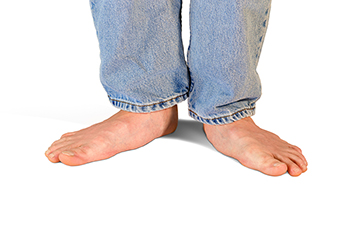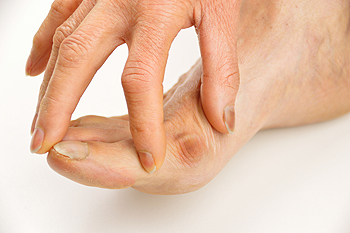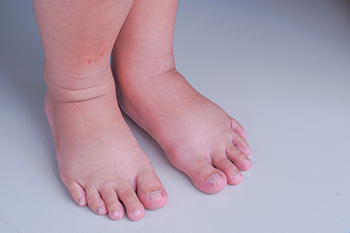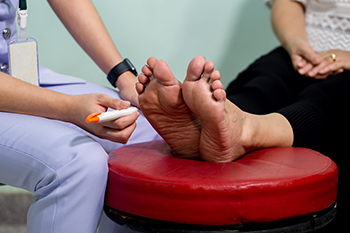Items filtered by date: July 2023
Stretches for Flat Feet

Flat feet are an abnormal foot structure the majority of babies are born with. The arch generally develops during the teenage years, and adults who have never developed an arch may have endured a foot injury, or it may have occurred from genetic reasons. There are some adults who have a consistent achy sensation with flat feet, and performing certain stretches may help to alleviate this. These exercises can help people who have full or partial flat feet, causing the arch to become stronger. A towel scrunch is done by sitting in a chair and having a towel lying at the feet. The towel is grabbed with the toes, inch by inch until it is completely under the foot. Stair raises are performed by standing on a step with the toes and balls of the feet. This is followed by pushing in and raising the heels into that air, and holding for several seconds. It is beneficial to repeat this as often as possible throughout the day. If you have flat feet and are looking for appropriate stretches to perform, it is suggested that you speak with a podiatrist who can help you with proper information.
Flatfoot is a condition many people suffer from. If you have flat feet, contact one of our podiatrists from Ankle & Foot Care Center. Our doctors will treat your foot and ankle needs.
What Are Flat Feet?
Flatfoot is a condition in which the arch of the foot is depressed and the sole of the foot is almost completely in contact with the ground. About 20-30% of the population generally has flat feet because their arches never formed during growth.
Conditions & Problems:
Having flat feet makes it difficult to run or walk because of the stress placed on the ankles.
Alignment – The general alignment of your legs can be disrupted, because the ankles move inward which can cause major discomfort.
Knees – If you have complications with your knees, flat feet can be a contributor to arthritis in that area.
Symptoms
- Pain around the heel or arch area
- Trouble standing on the tip toe
- Swelling around the inside of the ankle
- Flat look to one or both feet
- Having your shoes feel uneven when worn
Treatment
If you are experiencing pain and stress on the foot you may weaken the posterior tibial tendon, which runs around the inside of the ankle.
If you have any questions please feel free to contact our office located in Jupiter, FL . We offer the newest diagnostic and treatment technologies for all your foot and ankle needs.
Why Do Bunions Develop?

A bunion is a bone disorder that is on the side of the big toe, and it will gradually become larger if treatment is not received. Bunions can develop as a result of wearing shoes that do not have enough room in the toe area to move freely in. Severe bunions may cause the other toes to shift together and larger shoes may need to be purchased. Some people are born with an abnormal foot structure causing the feet to be out of alignment. This may affect the metatarsophalangeal joint, possibly causing a bunion to form. Overpronation, or the amount the foot rolls inward while walking, may lead to a bunion developing. Additionally, people who have flat feet may have bunions, and wearing orthotics may help to stabilize the arch of the foot. A protective pad can be worn over the bunion to help prevent corns from developing on top of it. This can happen as the top of the bunion rubs against the shoe, causing pain and discomfort. If you have a bunion, it is strongly suggested that you are under the care of a podiatrist who can help you with permanent relief options.
If you are suffering from bunions, contact one of our podiatrists of Ankle & Foot Care Center. Our doctors can provide the care you need to keep you pain-free and on your feet.
What Is a Bunion?
A bunion is formed of swollen tissue or an enlargement of boney growth, usually located at the base joint of the toe that connects to the foot. The swelling occurs due to the bones in the big toe shifting inward, which impacts the other toes of the foot. This causes the area around the base of the big toe to become inflamed and painful.
Why Do Bunions Form?
Genetics – Susceptibility to bunions are often hereditary
Stress on the feet – Poorly fitted and uncomfortable footwear that places stress on feet, such as heels, can worsen existing bunions
How Are Bunions Diagnosed?
Doctors often perform two tests – blood tests and x-rays – when trying to diagnose bunions, especially in the early stages of development. Blood tests help determine if the foot pain is being caused by something else, such as arthritis, while x-rays provide a clear picture of your bone structure to your doctor.
How Are Bunions Treated?
- Refrain from wearing heels or similar shoes that cause discomfort
- Select wider shoes that can provide more comfort and reduce pain
- Anti-inflammatory and pain management drugs
- Orthotics or foot inserts
- Surgery
If you have any questions, please feel free to contact our office located in Jupiter, FL . We offer the newest diagnostic and treatment technologies for all your foot care needs.
Why Are My Feet Swollen?

The feet are the foundation of the body and are capable of providing adequate balance and support. There are several bones, muscles and tendons that each foot has, and all work together to provide mobility. Patients who stand for long periods may develop edema, which is the medical term for swollen feet. Gravity can cause the blood to pool in the lower legs and feet, and shoes can become tighter. Swollen feet may also be prevalent among pregnant women and people who eat foods with excessive amounts of salt. Swollen feet may be reduced when frequent walking is done and salty foods are reduced. It is helpful to drink plenty of water daily, in addition to wearing compression socks or stockings. Being obese may lead to developing swollen feet, and it is beneficial to eat healthy foods. This may help to reduce or eliminate swollen feet. If your feet have become swollen, it is suggested that you visit a podiatrist who can correctly diagnose and offer treatment options for this problem.
Swollen feet can be a sign of an underlying condition. If you have any concerns, contact one of our podiatrists of Ankle & Foot Care Center. Our doctors can provide the care you need to keep you pain-free and on your feet.
Swollen feet are a common ailment among pregnant women and people who stand or sit for extended periods. Aging may increase the possibility of swollen feet and patients who are obese often notice when their feet are swelling too. There may be medical reasons why swollen feet occur:
- Phlebitis - A condition that causes the veins to become inflamed and can also cause leg pain.
- Liver disease - This may lead to low blood levels of albumin which is a protein. This can cause fluid in the blood to pass into the tissues and several areas of the body can become swollen.
- Heart failure - When the heart doesn’t pump properly the blood that is normally pumped back to the heart can pool in the veins of the legs causing swollen feet.
- Kidney disease - One of the main functions of the kidneys is releasing excess fluid in the body. This type of condition can make it difficult for the kidneys to function properly, and as a result the feet may become swollen.
- Deep-vein thrombosis (DVT)- This is a serious condition where blood clots form in the veins of the legs. They can block the return of blood from the legs to the heart which may cause the feet to swell. It is important to be treated by a podiatrist if this condition is present.
Swollen feet can also be caused by bone and tendon conditions, including fractures, arthritis, and tendinitis. Additionally, there may be skin and toenail conditions and an infection may cause the feet to swell. Patients who take medicine to treat high blood pressure may be prone to getting swollen feet.
Many patients elevate their feet to help relieve the swelling and this is generally a temporary remedy. When a podiatrist is consulted the reason behind the swelling can be uncovered and subsequently treated.
If you have any questions please feel free to contact our office located in Jupiter, FL . We offer the newest diagnostic tools and technology to treat your foot and ankle needs.
Do Your Child's Feet Hurt?
Foot Problems Linked to Diabetes

Diabetes, which is a blood sugar and insulin imbalance, is a serious and possibly life-threatening disease. One of the side effects that may come from having diabetes is foot problems. These may be the result of numbness, called sensory diabetic neuropathy, and the inability of wounds to properly heal, termed peripheral vascular disease. Diabetic neuropathy is nerve damage that limits the patient’s ability to feel the presence of a cut or wound on the foot. If a sore goes untreated, it can develop into an ulcer. Peripheral neuropathy is the constricting of the blood vessels to the feet and toes, caused by high levels of blood sugar. This poor blood flow severely affects the healing process, increasing the danger of an ulcer becoming gangrenous. Common sources of foot problems in diabetics include athlete’s foot, fungal nail infections, corns, blisters, and dry skin. In addition to checking the feet daily for sores and wounds, it is suggested that a diabetic make regular appointments with a podiatrist for examination and treatment of their feet.
Diabetic foot care is important in preventing foot ailments such as ulcers. If you are suffering from diabetes or have any other concerns about your feet, contact one of our podiatrists from Ankle & Foot Care Center. Our doctors can provide the care you need to keep you pain-free and on your feet.
Diabetic Foot Care
Diabetes affects millions of people every year. The condition can damage blood vessels in many parts of the body, especially the feet. Because of this, taking care of your feet is essential if you have diabetes, and having a podiatrist help monitor your foot health is highly recommended.
The Importance of Caring for Your Feet
- Routinely inspect your feet for bruises or sores.
- Wear socks that fit your feet comfortably.
- Wear comfortable shoes that provide adequate support.
Patients with diabetes should have their doctor monitor their blood levels, as blood sugar levels play such a huge role in diabetic care. Monitoring these levels on a regular basis is highly advised.
It is always best to inform your healthcare professional of any concerns you may have regarding your feet, especially for diabetic patients. Early treatment and routine foot examinations are keys to maintaining proper health, especially because severe complications can arise if proper treatment is not applied.
If you have any questions please feel free to contact our office located in Jupiter, FL . We offer the newest diagnostic and treatment technologies for all your foot and ankle needs.

